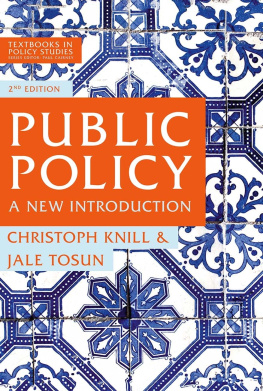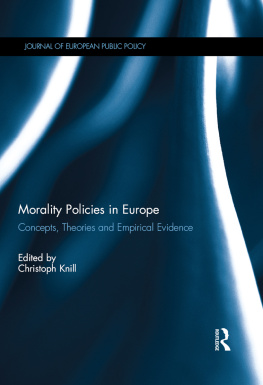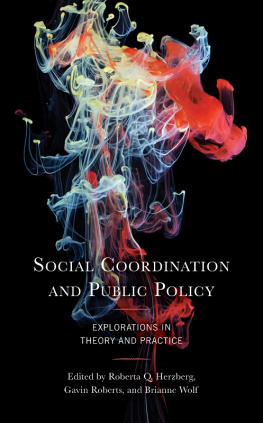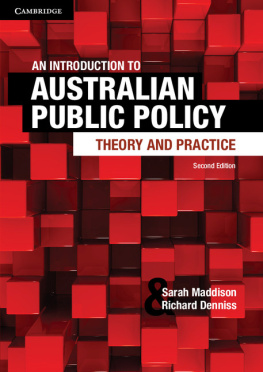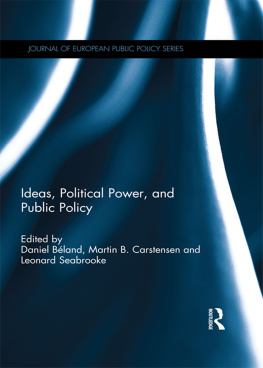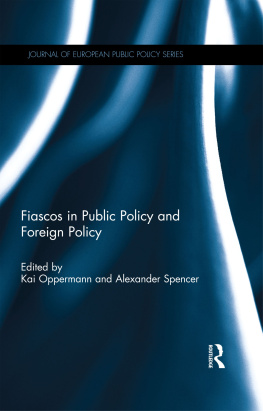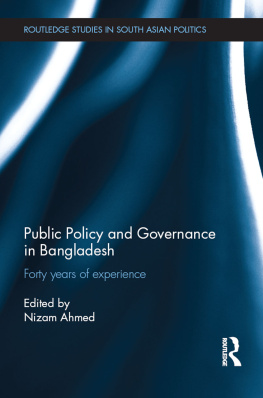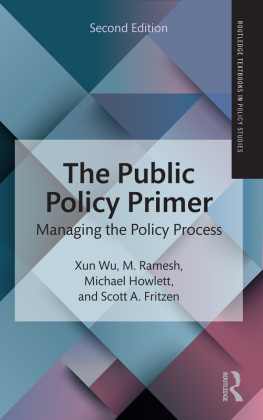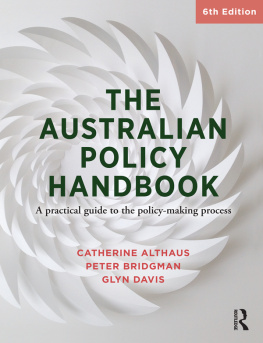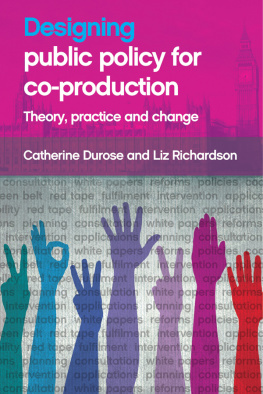Public Policy
Textbooks in Policy Studies
Series Editor: Paul Cairney, University of Stirling, UK
Editorial Advisory Group: Jennifer Curtin, University of Auckland, New Zealand; Jordi Diez, University of Guelph, Canada; Claire Dunlop, University of Exeter, UK; Tanya Heikkila, University of Colorado Denver, USA; Karin Ingold, University of Bern, Switzerland; Allan McConnell, University of Sydney, Australia; Daniel Nohrstedt, Uppsala University, Sweden; Jale Tosun, Heidelberg University, Germany; Chris Weible, University of Colorado Denver, USA.
There has never been a more important time in which to understand the dynamics of public policy. Key events across the globe have prompted debate about political crisis, from post truth and emotionally driven politics to the sense that international institutions or agreements are not well equipped to solve pressing global crises such as public health epidemics, poverty and climate change. Yet, a key feature of policy studies is the identification and explanation of policy-making stability and policy continuity, with salient issues gathering most of our attention while most issues are processed out of the public spotlight. A major problem for democracy is that few people know about the choices governments make in their name.
We need as many perspectives as possible on how such policy dynamics operate, and what effect they have on developments in different regions and policy areas. Such developments will not be covered fully by research monographs, with a limited focus and audience. We also need textbooks which combine academic rigour with a broad analytical focus and an appeal to a wide audience. This series helps develop this focus on research and learning, serving the global market of undergraduate, postgraduate and professional education in public policy and related disciplines such as political science and social policy.
PUBLISHED
Anneliese Dodds
Comparative Public Policy (second edition)
Paul Cairney
Understanding Public Policy (second edition)
Christoph Knill and Jale Tosun
Public Policy: A New Introduction (second edition)
FORTHCOMING
Madeleine Pill
Urban Policy and Politics
Alison Ritter
Drug Policy
PLANNED
Researching Public Policy
Global Public Policy
and more
Christoph Knill and Jale Tosun, under exclusive licence to Macmillan Education Limited 2012, 2020
All rights reserved. No reproduction, copy or transmission of this publication may be made without written permission.
No portion of this publication may be reproduced, copied or transmitted save with written permission or in accordance with the provisions of the Copyright, Designs and Patents Act 1988, or under the terms of any licence permitting limited copying issued by the Copyright Licensing Agency, Saffron House, 610 Kirby Street, London EC1N 8TS.
Any person who does any unauthorized act in relation to this publication may be liable to criminal prosecution and civil claims for damages.
The authors have asserted their rights to be identified as the authors of this work in accordance with the Copyright, Designs and Patents Act 1988.
This edition published 2020 by
RED GLOBE PRESS
Previous editions published under the imprint PALGRAVE
Red Globe Press in the UK is an imprint of Macmillan Education Limited, registered in England, company number 01755588, of 4 Crinan Street, London, N1 9XW.
Red Globe Press is a registered trademark in the United States, the United Kingdom, Europe and other countries.
ISBN 978-1-137-57330-8 hardback
ISBN 978-1-137-57329-2 paperback
This book is printed on paper suitable for recycling and made from fully managed and sustained forest sources. Logging, pulping and manufacturing processes are expected to conform to the environmental regulations of the country of origin.
A catalogue record for this book is available from the British Library.
A catalog record for this book is available from the Library of Congress.
Contents
List of Figures
List of Tables
List of Boxes
Foreword to the Second Edition
When we first considered publishing a second edition of this book, we estimated that we would simply update the previous topics by adding new literature and providing additional clarifications where necessary. However, once we got started, we realized that a much greater effort would be needed, which also resulted in a significantly lengthier revision process than we or the publisher had wished for. While on the one hand we wanted to get the revision done as quickly as possible, on the other we realized that we were observers to some changes in real-life politics and the study of public policy that warranted our attention.
Let us start with the positive developments in politics that we could witness and on which we elaborate in this new edition. When we wrote the first edition of this book in 2010 and 2011, Europe and North America were still under the impression of the economic and financial crisis that had unfolded in 2007 and 2008. A decade later, almost all countries hit severely by the crisis have recovered. One of the countries that was affected particularly severely by the crisis was Greece. After years of economic hardship and painful reforms, the Greek economy is resurgent and policy-makers can shift their attention to other important policy issues, of which there are many. The second positive development relates to the growing attention paid to fighting climate change. A decade ago, climate policy scholars felt as if their findings would never feature prominently in real-life politics. Today, we can safely state that climate change has reached the political agendas of countries in all world regions. Chile, for instance, has placed climate action at the top of its political agenda and aspires to become a climate leader in Latin America. A third development relates to growing demand from policy-makers for policy analysis performed by public policy scholars. In European countries, for example, research funding has risen for projects that strive to inform policy-making through providing a detailed analysis of policy problems and potential policy solutions. In response to these developments, we condensed the discussion of the policy implications of the economic and financial crisis, while conversely discussing climate policy and politics more extensively. In addition, we modified the conclusion to provide guidance on how to do policy analysis.
However, the last decade was also marked by numerous less positive developments, to which we allude in this book. From a European perspective, to many academic as well as political observers, the outcome of the 2016 British referendum on whether to stay in or leave the European Union (EU) came as a shock. Few expected that a majority of British voters would vote to leave the EU. Since the referendum, we have been able to observe how difficult it has been for British policy-makers to deliver Brexit. We could also see how the Brexit vote changed the political climate in both the United Kingdom and the EU. After many years of considering the possibility of enlargement only, now for the first time a member state might leave the EU, which will have far-reaching and yet not easy to anticipate consequences for all parties concerned. A second development, which is also related to Brexit, is the rise of populism, which can also be found in almost all world regions. Inherent to populism is a fundamental mistrust in the capability of political elites to govern, which calls into question the essence of representative democracy. Populism has changed how we talk to each other and about what, and how public policies are being made. Clearly, without digitization, populism would not have been as successful at it is today. From this, it follows that policy studies need to pay more attention to modern forms of communication. Third, and related in part to the rise of populism, is a tendency to question (economic) globalization and multilateralism. We could witness a my country comes first logic which was perhaps absent or simply not visible when we wrote the first edition of this book. This change in the perception of globalization has important implications for the functioning of international organizations such as the World Trade Organization, which was not designed to govern trade wars. We have updated and expanded the discussion of the relevant parts of the book in order to reflect these developments.

